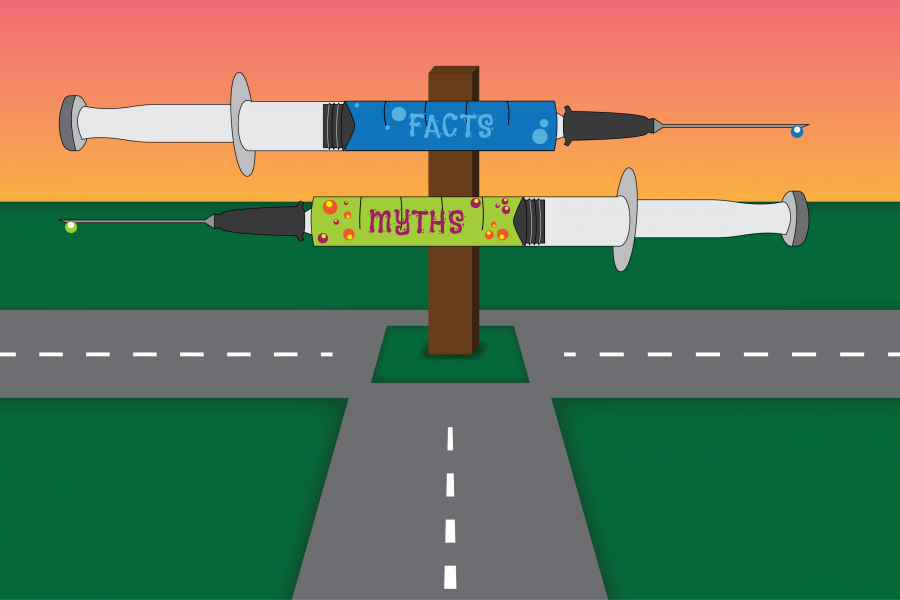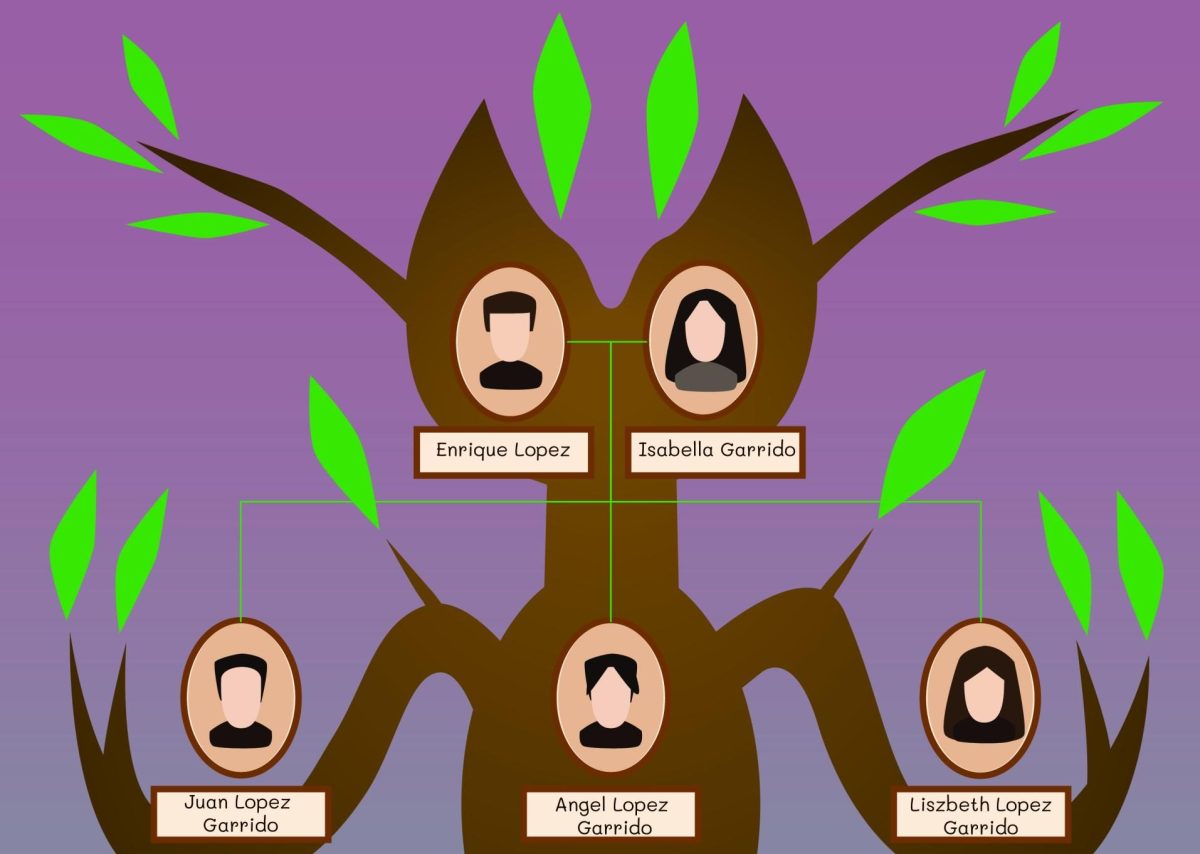By HARRIET RAMOS
@HarrietRamosETC
The COVID-19 vaccines have brought hope of a return to normal life for some, but misconceptions are still prevalent online.
These vaccine myths range from concern over side effects to fears based on conspiracy theories.
Daniel Ramirez, social work faculty member at Eastfield and owner of Real Solutions Counseling, said people don’t know what to believe about the vaccines.
“I think a lot of the problem is we don’t know if the information we’re getting is factual or not,” Ramirez said. “You hear one thing and then you go turn on the TV and you hear five other things.”
COVID-19 vaccinations have been available to everyone in Texas over the age of 16 since March 29, and according to the Texas Department of State Health Services, there have been over 14 million doses administered as of April 13.
Eastfield is a vaccination site, and even though Dallas College doesn’t provide the vaccine to employees and students, they partner with Parkland Hospital and other area clinics who let them know when doses become available for college employees and students.
On April 8 Dallas College administration sent an email to students letting them know they are now eligible for a vaccine through the Parkland Health System.
Speed of Delivery
Ramirez said he has had numerous conversations with his clients about COVID-19 vaccines, and one reason people are hesitant to get vaccinated is because of how fast the vaccines were produced.
“We typically are used to hearing that vaccines take a while to get done,” he said.
Vaccines can take anywhere from 10-15 years to be developed, according to the History of Vaccines website.
Of the three vaccines available in the United States, Pfizer-BioNTech and Moderna were rolled out in December 2020, just a year after the pandemic began.
The Johnson & Johnson Janssen vaccine came out in March.
In spite of being developed in less than a year, the Pfizer and Moderna vaccines were created using a messenger RNA technology that had already been in development for two decades, according to Johns Hopkins Medicine, a non-profit organization that specializes in medical research.
No steps were skipped in the testing process, and social media played a part in locating volunteers willing to be vaccinated in the trial phases, thereby speeding up the research, according to Johns Hopkins.
Both the Pfizer and Moderna vaccines require two doses. The second dose of the Pfizer vaccine is given 3-6 weeks after the first, and the second dose of Moderna is given 4-6 weeks after the first.
In clinical trials Moderna was shown to be 94% effective and Pfizer 95% effective in preventing COVID-19 infection from the original virus, according to the Centers for Disease Control.
There are several variants of COVID-19 that have surfaced around the world. The CDC has classified at least five of these as variants of concern because of their high level of transmissibility or potential to cause severe illness.
One of these variants, the B.1.1.7 from Great Britain, is now the dominant strain in the United States as of April 7, according to the CDC.
Studies by Duke University have found the Moderna vaccine provides effective protection against the B.1.1.7 variant. The researchers didn’t test the Pfizer vaccine, but they said the results should be the same since the same technology was used in both vaccines.
The study also found Moderna was less effective against the B.1.351 variant from South Africa, and a study by Tel Aviv University released April 10 found similar results for Pfizer.
The Johnson & Johnson vaccine is given in a single dose but was put on pause by the Food and Drug Administration and CDC April 13 after six individuals developed blood clotting disorders after receiving the vaccine. More than 7 million people have received the Johnson & Johnson vaccine.
No such side effects have been reported from the Pfizer and Moderna vaccines.
Infertility
Another myth surrounding COVID-19 vaccines is that they will cause infertility.
Ramirez said one of his clients opted not to get vaccinated for that reason. Ramirez said she planned to start a family soon, and said she was concerned the vaccine would affect her ability to conceive.
The American College of Obstetricians and Gynecologists, the American Society for Reproductive Medicine and the Society for Maternal-Fetal Medicine issued a joint statement on Feb. 21 in response to this misconception.
“As experts in reproductive health, we continue to recommend that the vaccine be available to pregnant individuals,” the statement said. “No loss of fertility has been reported among trial participants or among the millions who have received the vaccines since their authorization, and no signs of infertility appeared in animal studies.”
DNA Manipulation and Microchips
Another vaccine myth is that the messenger RNA technology used by Pfizer and Moderna will change the DNA structure of vaccinated individuals.
According to Johns Hopkins, the mRNA enters the cells and instructs them to make a protein found in the coronavirus which stimulates the immune system to fight off the virus. The mRNA, however, does not affect the nucleus of the cells where the DNA is located.
Unlike typical vaccines which use a weakened form of the pathogen to provoke an immune system response, the COVID-19 vaccines do not contain the SARS-CoV-2 coronavirus., according to Johns Hopkins.
Contrary to social media rumors, the vaccines also do not contain microchips or tracking devices, according to Johns Hopkins. The vaccines do contain fats to protect the mRNA, salts and a small amount of sugar.
Age
Ramirez said another reason some people aren’t getting vaccinated is because they think they are too young to get a serious case of COVID-19.
Even though it is true older people are at a higher risk for serious COVID-19 illness, there have been instances of young people getting seriously ill also. A study published by the Journal of the American Medical Association in September 2009 showed that out of 3,000 young adults ages 18-34, 21% ended up in intensive care.
Iris Bechtol, the director of Eastfield’s art gallery, said even though she isn’t in a high-risk age group and has been vaccinated, she is still concerned that those who don’t get vaccinated are putting others at risk.
“We need to be wearing masks as long as we can so that people who aren’t vaccinated aren’t exposing us,” she said. “Say 50% get [the vaccine] and 50% don’t get it. That’s not going to be good for the outcome of herd immunity.”








